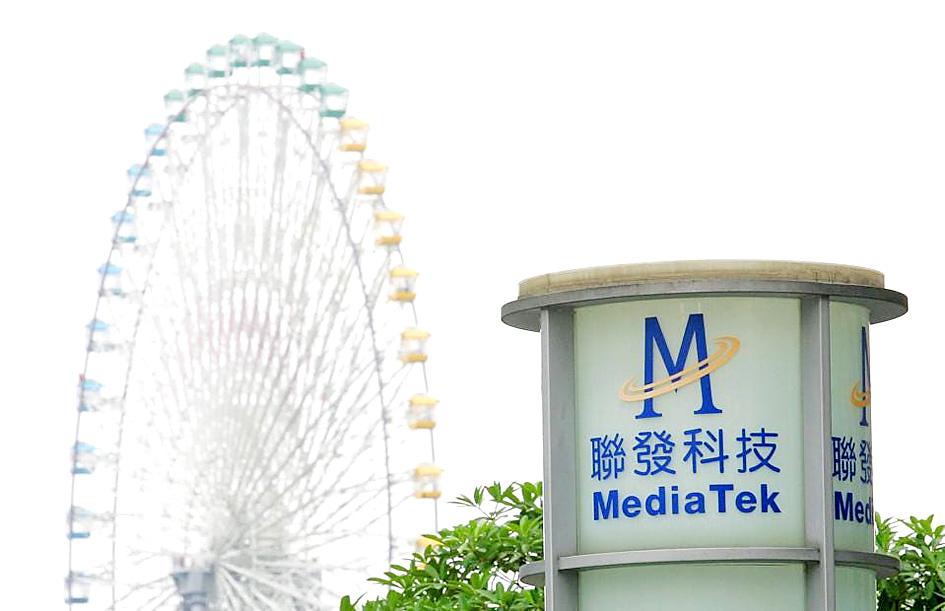MediaTek Inc (聯發科) yesterday said it would ship the first 5G chips for vehicles to customers in the Asia-Pacific region by the end of the year, as it moves to expand the reach of its 5G chips beyond smartphones.
The Hsinchu-based chip designer said it has been developing 5G chips for connected vehicles over the past few years, targeting applications such as telematics and in-vehicle information systems.
“We are seeing demand for 5G technology from numerous makers of connected cars, including electric vehicle makers. We have obtained numerous orders from automakers to supply 5G modem chips with highly integrated features,” J.C. Hsu (徐敬全), MediaTek vice president in charge of wireless communications, told a media briefing in Taipei.

Photo: Maurice Tsai, Bloomberg
“We expect the chips to be on the market by the end of this year. First, in the Asia-Pacific market and next year, they should be available in Europe. We have made quite good progress,” Hsu said.
Smartphone chips are the company’s biggest revenue contributor, accounting for about 60 percent.
With multiple revenue sources, the company said it was sticking to its annual revenue growth target of 20 percent and that 5G chip shipments would remain unchanged.
“There is buzz about market demand, but we believe there is also a clear trend of increasing 5G penetration,” MediaTek chief financial officer David Ku (顧大為) said. “In addition to smartphones, other MediaTek business groups are growing.”
Ku’s remarks came after TF International Securities (天風國際證券) analyst Kuo Ming-chi (郭明錤) wrote on Twitter yesterday that MediaTek has slashed 5G chip orders by between 30 and 35 percent for delivery in the fourth quarter.
Kuo attributed the order cuts to sluggish demand from almost all Chinese smartphone vendors, from Xiaomi Corp (小米) to Oppo Mobile Telecommunications Corp (歐珀).
MediaTek’s rival, Qualcomm Inc, has had orders for chips used in high-end 5G phones increase by as much as 15 percent in the second half of this year, Kuo said.
MediaTek yesterday launched its first 5G chip, the Dimensity 1050 system-on-chip (SoC), that supports mmWave and sub-6GHz technologies.
The chip, which deploys Taiwan Semiconductor Manufacturing Co’s ( 台積電) ultra-efficient 6-nanometer technology, is to be available next quarter, it said.
MediaTek said telecoms are balking at deploying networks that support mmWave technology due to macroeconomic uncertainty.
The technology is only commercially available in North America, leaving the penetration of mmWave technology at only 10 percent of all 5G technology worldwide, it said.
China is not showing any interest in installing base stations that support mmWave technology, it added.

Quanta Computer Inc (廣達) chairman Barry Lam (林百里) is expected to share his views about the artificial intelligence (AI) industry’s prospects during his speech at the company’s 37th anniversary ceremony, as AI servers have become a new growth engine for the equipment manufacturing service provider. Lam’s speech is much anticipated, as Quanta has risen as one of the world’s major AI server suppliers. The company reported a 30 percent year-on-year growth in consolidated revenue to NT$1.41 trillion (US$43.35 billion) last year, thanks to fast-growing demand for servers, especially those with AI capabilities. The company told investors in November last year that

Taiwanese suppliers to Taiwan Semiconductor Manufacturing Co. (TSMC, 台積電) are expected to follow the contract chipmaker’s step to invest in the US, but their relocation may be seven to eight years away, Minister of Economic Affairs J.W. Kuo (郭智輝) said yesterday. When asked by opposition Chinese Nationalist Party (KMT) Legislator Niu Hsu-ting (牛煦庭) in the legislature about growing concerns that TSMC’s huge investments in the US will prompt its suppliers to follow suit, Kuo said based on the chipmaker’s current limited production volume, it is unlikely to lead its supply chain to go there for now. “Unless TSMC completes its planned six

Intel Corp has named Tasha Chuang (莊蓓瑜) to lead Intel Taiwan in a bid to reinforce relations between the company and its Taiwanese partners. The appointment of Chuang as general manager for Intel Taiwan takes effect on Thursday, the firm said in a statement yesterday. Chuang is to lead her team in Taiwan to pursue product development and sales growth in an effort to reinforce the company’s ties with its partners and clients, Intel said. Chuang was previously in charge of managing Intel’s ties with leading Taiwanese PC brand Asustek Computer Inc (華碩), which included helping Asustek strengthen its global businesses, the company

Power supply and electronic components maker Delta Electronics Inc (台達電) yesterday said second-quarter revenue is expected to surpass the first quarter, which rose 30 percent year-on-year to NT$118.92 billion (US$3.71 billion). Revenue this quarter is likely to grow, as US clients have front-loaded orders ahead of US President Donald Trump’s planned tariffs on Taiwanese goods, Delta chairman Ping Cheng (鄭平) said at an earnings conference in Taipei, referring to the 90-day pause in tariff implementation Trump announced on April 9. While situations in the third and fourth quarters remain unclear, “We will not halt our long-term deployments and do not plan to